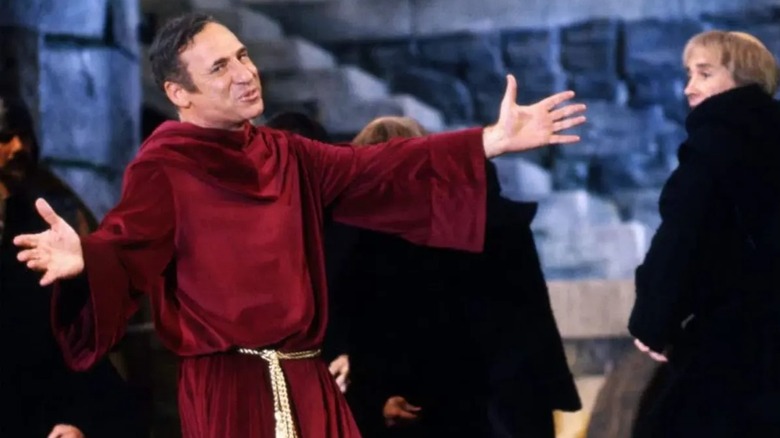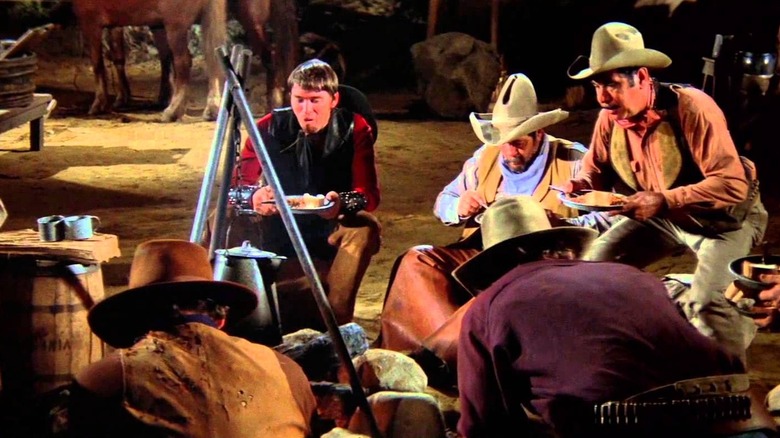Mel Brooks Had A Brilliant Trick For Dealing With Studio Notes: Just Say Yes
In the year 2000, author Leonard B. Stern published a hilarious book called "A Martian Wouldn't Say That!!," a compilation of studio notes written by executives. The book is a litany of absurd demands and strange requests that perhaps made sense in a broader boardroom discussion, but which became complete nonsense when written down and handed to an actual screenwriter. The title comes from a note a studio head gave to the writers of the 1960s sitcom "My Favorite Martian," claiming that dialogue needed to be changed due to its lack of Martian authenticity. Seeing as no Earthling has met a Martian (so far as we know), surely the writers would be granted a sliver of artistic license. Other gems from the book include nonsensical comments like, "Re: 'The Fred Astaire Special' — too much dancing" and "Can you make the rabbi less Jewish?"
All filmmakers working with studio oversight will receive some kind of note, memo, or demand from the higher-ups multiple times in their careers, and sometimes the notes may be helpful, but often they will be clueless. Anyone who has worked in show business might share the view that "studio notes" is synonymous with "executives throwing their weight around." In such cases, notes don't actually mean to aid production but are mere examples of a wealthy executive asserting their limited leadership over a creative endeavor.
Legendary comedian Mel Brooks has, as one might imagine, received a great number of studio notes in his career. Some of them you would not believe. Luckily, Brooks adopted a simple philosophy to studio notes early in his career. No matter how outrageous or stupid or absurd the demand, say yes. Say yes to everything. Then, once the honchos have been placated, do what you were going to do anyway.
Lose the fart scene
Mel Brooks has publicly listed several times some of the more ridiculous notes he has received. In a 2017 interview with the Daily Beast, Brooks sharply remembered some of the nuggets of joy handed to him by Warner Bros. while he was working on "Blazing Saddles." Given the film's crassness and subject matter, one might be able to predict what a tetchy pencil-pusher might be nervous about. Some examples included: "Lose the fart scene," "cut out any racial and ethnic jokes," and "edit scenes where a horse and an old lady get punched."
"Blazing Saddles," for in uninitiated, was about a racist Old West town called Rockridge who is appointed a Black sheriff named Bart (Cleavon Little). Bart bears the brunt of the moronic townsfolk but remains affably devoted to his job. The script was co-written by Richard Pryor and is very much a satire of common, racist attitudes in America's favorite adventure genre. As such, Brooks was utterly baffled when he was asked "can you reshoot Black Bart with a white actor?" He rightfully responded, "What? If I had made their changes the film would have been just 14 minutes long!" Brooks regrets throwing the notes away, thinking they would have made a good comedy book someday.
In a 2021 interview with the New Yorker, Brooks even recalled a note he received working on "The Producers." Evidently, they didn't like Gene Wilder. As Brooks put it:
"I'd learned one very simple trick: say yes. Simply say yes. Like Joseph E. Levine, on 'The Producers,' said, 'The curly-haired guy—he's funny looking. Fire him.' He wanted me to fire Gene Wilder. And I said, 'Yes, he's gone. I'm firing him.' I never did. But he forgot."
Thank goodness for forgetful executives.

